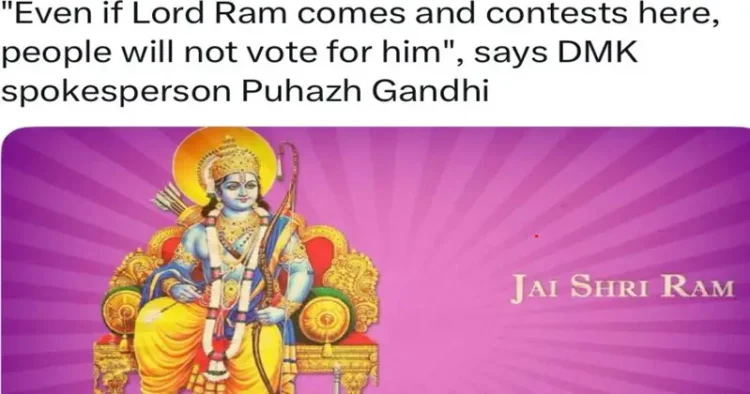Known for employing divisive tactics during times of criticism, the DMK has often resorted to playing the caste and religion card to divert attention from alleged inefficiencies and corruption charges.
In a recent television debate on Times Now, Puhazh Gandhi stated, “Even if Bhagwan Ram comes and contests here (Tamil Nadu), people may fall at his feet, people may light diyas, etc, but people will not vote for him. That is the rationalist viewpoint of the people of Tamil Nadu under the Dravidian movement.”
The statement has drawn criticism from various quarters, with CT Pallavai questioning the DMK’s intent in dragging Bhagwan Ram into politics. Pallavai accused the DMK of playing the “politics of hate” and recalled instances from the past where the party leaders engaged in actions disrespectful to Bhagwan Ram. She highlighted historical events, including EVR leading a procession where Bhagwan Ram’s idol was hit with chappals and Karunanidhi mocking Ram Sethu by questioning Bhagwan Ram’s engineering qualifications.
The controversy deepened as Udhayanidhi Stalin expressed a desire to “eradicate” Sanatan Dharma, equating it to Dengue Malaria, while A Raja went further by comparing Sanatan Dharma to AIDS and leprosy. Pallavai asserted that supporting the DMK and the INDI Alliance is akin to endorsing the eradication of Sanatan Dharma.
Shocking
DMK hate for Sanatan continues
“Even if Lord Ram comes & contests elections in Tamil Nadu, people will NOT vote for him”🤨🤨
Why drag Prabhu Ram into politics?
This is all the politics of hate of DMK?
Recall how EVR had lead a procession in which people hit… pic.twitter.com/G5fycHZTBc
— PallaviCT (Modi Ka Parivar) (@pallavict) December 17, 2023
In September 2023, TN Sports and Youth Welfare Minister Udhaya Nidhi Stalin drew condemnation for expressing a desire to “eradicate” Sanatan Dharma, comparing it to diseases like Dengue, Malaria, and Covid. The controversial statement triggered nationwide criticism. DMK MP A Raja escalated the rhetoric by likening Sanatan Dharma to leprosy and AIDS, advocating for its complete eradication. Other DMK leaders, including A. Raja and K. Ponmudy, openly supported Udhayanidhi’s stance, adding derogatory remarks about the Hindu religion.
The trend of controversial remarks from DMK leaders is not new. DMK patriarch M Karunanidhi, during a debate on the Sethu Samuthram project, questioned Bhagwan Ram’s qualifications, asking which engineering college he graduated from and when he built the bridge, casting doubts on the religious narrative.
In October, former Rajya Sabha MP and DMK spokesperson TKS Elangovan ridiculed the consecration ceremony of the Ram Janmabhoomi Temple in Ayodhya. He dismissed the event, stating, “They have demolished history and replaced it with mythology. Ram’s birth is mythology, it is a story from Ramayana. It is literature.” Elangovan accused the BJP of using Ram as a political tool for their gains, emphasising the party’s alleged disregard for historical facts.
#WATCH | On the invitation to PM Modi for 'pran pratishtha' of Ram Temple in Ayodhya, DMK leader TKS Elangovan says, "What can I say? They have demolished history and replaced it with mythology. Any country should be proud of its history, it should know the history. Ram's birth… pic.twitter.com/drTikUrlHD
— ANI (@ANI) October 26, 2023
In a fresh controversy earlier this year, the Tamil Nadu Assembly became a battleground for sharp exchanges between members after a Communist Party of India-Marxist (CPI-M) MLA referred to the Ramayana as an “imaginary epic.” The remarks led to heated debates, with both the BJP and AIADMK demanding the expunction of such statements from the records.
The incident occurred during discussions on a resolution moved by Chief Minister M K Stalin, urging the Centre to implement the Sethusamudram ship canal project. V P Nagai Maali of CPI-M, while expressing the party’s stance, criticized the Union government for sidelining the project in the name of ‘Ramar Palam’ (Ram Sethu) and invoked Bhagwan Ram. He stated that some are attempting to portray as history what is “fiction, imaginations, and beliefs,” asserting that works like the Ramayana are classical literary pieces based on imagination.
This is not the first instance of contentious statements regarding Bhagwan Ram and Hindu epics in Tamil Nadu. In 1971, during a Dravidar Kazhagam (DK) conference in Salem, it is alleged that EVR slapped a portrait of Bhagwan Ram with slippers and adorned it with a garland made of slippers. DK leader Veeramani later claimed that due to this act, the DMK won a significant number of seats in the state assembly elections.
Adding to the controversy, Jothimani, a Congress MP from Karur and a partner in the I.N.D.I. Alliance, feigned ignorance about Bhagwan Ram during an interview with Padmaja Joshi of Times Now. She stated, “I’m from Tamil Nadu. I don’t know Ram because we are indigenous people. We follow ‘ancestral worship.’ You ask anybody in Tamil Nadu. We don’t see any Ram Temple.”
Despite such statements, Tamil Nadu has several places of worship associated with Bhagwan Ram and the Ramayana, including Rameshwaram, Eri Kaatha Ramar Temple in Madurantakam, Vaduvoor Ramar, Thillaivilagam Ramar Temple, Kumbakonam Ramaswamy Temple, and others. However, the Dravidian movement, historically rooted in rationalism, has attempted to distance itself from these cultural and religious aspects.
This controversy unfolds amidst criticism of the DMK’s handling of the recent Chennai flood, adding fuel to the ongoing debate about the party’s approach to governance. As the nation awaits the inauguration of the Ram Mandir, these statements have intensified the political discourse, raising questions about the role of religion and divisive rhetoric in Tamil Nadu’s political landscape.




















Comments